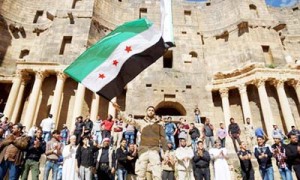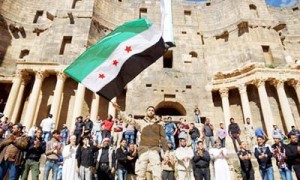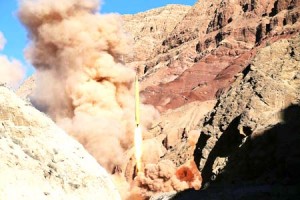- All attention has been on Isis. But the moment a truce gave Syrians scope to protest, they remind the world that this is a war that began with a dictator
The Guardian
Editorial
A two-week old truce in Syria is just barely holding. In the coming days and weeks, it should become clearer whether this “cessation of hostilities”, brokered by the US and Russia, has any chance of lasting, and what hopes may still lie ahead for diplomacy to produce a negotiated settlement including a political transition. Yet while those crucial questions remain unanswered, there has been one striking, yet little noticed, development: Syrians have made use of the truce to come out on the streets to demonstrate in many localities, demanding the ouster of Bashar al-Assad.
They did so last Friday, one week into the truce, brandishing a central slogan: “The revolution continues.” And they are likely to do so again, after the prayers this Friday. Crowds gathered last week in dozens of towns, mostly in northern and southern rebel-held territory, but also in a Damascus suburb. It was a strong, symbolic way of rekindling the spirit of the 2011 popular uprising against the regime. It was also a powerful rebuke to all those who claim that the only issue in Syria now is violent jihadism, and the only question how to combat it.
Syrians have used the truce as an opportunity not just to relish a moment of relative calm, with fewer bombs and rockets falling on cities, but to make clear that the demands they formulated in 2011 for political change at the top have not gone away. This serves as a reminder of what the Syrian crisis was all about to start with: a popular revolt against a dictator, against a family clan that has been in power for decades, and against a security apparatus whose central tenet has been to spread terror. After five years of a civil war which has caused an estimated 300,000 to 470,000 deaths and uprooted over half of the population, the very gesture of coming out on the streets with persistent political claims stands out as an admirable act of resilience. The message coming from these protesters, under skies that could yet prove to be only briefly clear of bomber planes, is one which should guide diplomacy. No sustainable peace agreement can afford to ignore the mood on the streets.
The Syrian uprising started five years ago almost to the day, on 18 March 2011, at a time when the Arab spring seemed to hold so much promise. Peaceful protests in Tunisia and Cairo’s Tahrir Square served as powerful inspiration. But as the Syrian protests grew, the regime started firing live ammunition at crowds, and arresting and torturing protesters, sometimes just teenagers. It is the scale of the repression that led anti-Assad groups to take up arms – initially to protect demonstrators. What started as a movement of democratic aspirations morphed into a relentless conflict, with foreign powers weighing in. Syrians have endured a state policy of mass murder on a scale that arguably has no precedent in recent times: Scud missiles, barrel bombs, chemical weapons, torture chambers, starvation, sieges. After the seizure of parts of the country by a complex web of Islamist groups, the west is focusing narrowly on Islamic State, and Russia has been substantially freed to dictate its terms for a truce. But nothing has diminished the hunger, inside Syria and among its refugee diaspora, for an end to autocracy. The bravery of protesters must be acknowledged. And their message heard.





